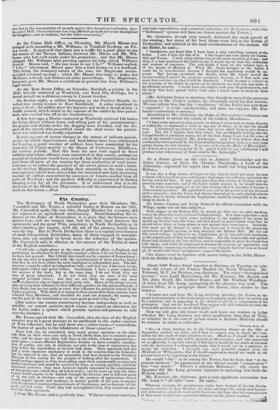At a dinner given on the 14th to Admiral Troubridge
and Sit James Curiae, at Deal, Sir Thomas Troubridge, a Lord of the Admiralty, expressed his regret that he could not bring forward the Ballot— It was also a deep source of regret to him, that he could not enjoy his see without reflecting that some unfortunate tradesman was suffering oppression for having voted for him. It was quite time that that system of tyranny and op- pression were removed ; and if the ballot would remove it, he would vote for it. So many were oppressed at the last election, that it was time it became a Government question. He regretted it was not in his power to bring forward such a measure ; but the Tories had shown themselves in such glaring colours lately, that he firmly believed the Legislature would be compelled to do some- thing to check it.
Sir James Carnac, not being fettered by official connexion with the Whigs, spoke out on this subject— With respect to the Reform Bill, he would say that was an utter 'mockery, unless the franchise were exercised independently. If it were right that a man should have thirty or furry votes, according to the number of his scree, he would say let him have his votes, and that would he much better than that he should drive thirty or forty others to vote against their consciences. Intimida- tion must not be allowed to exist ; they must put it down by the unceasing expression of public opinion, as they obtained the Reform Bill, lie did we like secret voting ; he liked to see Englishmen go to the poll with manliness, as the constituents of that borough had done. But his honourable and gallant friend had alluded to the late election, and he responded to what his friend had told them ; and whilst he continued to witness the exercise of oppression and intimidation, surpassing in abomination every thing he had erer seen or heard of, he would with heart and pleasure support the ballot.
[ Sir James must be familiar with secret voting at the India House does he dislike it there/]


























 Previous page
Previous page